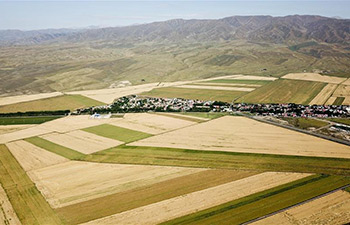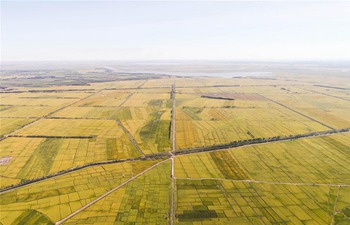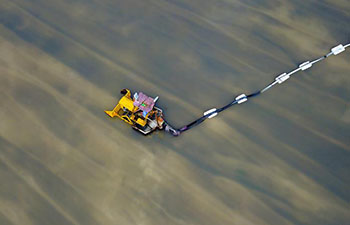by Burak Akinci
ANKARA, Sept. 3 (Xinhua) -- Turkey is seeking for the return of thousands of historical Anatolian artifacts smuggled abroad during the Ottoman Empire and in modern times, which is paying off despite many challenges.
Turkey has been working for a long time for the return of smuggled artifacts in both diplomatic and legal means.
One of these pieces is the Roman sarcophagus of Hercules, which was ruled to return to Turkey by a Swiss court in 2015. It should be returned to Turkish officials this week.
The sarcophagus that is believed to sculpted towards the end of the second century before Jesus-Christ in the ancient city of Dokimion, present day Antalya, dubbed the "Turkish Riviera" for its sunny touristic resorts, when the area was under Roman rule. It was smuggled from Turkey in the 1960s, according to officials.
The ancient roman artifact, which depicts the 12 labors of the legendary Hercules, was on display at the Geneva University Museum of Arts and History. It will be delivered to the Antalya Museum where it will be displayed.
Turkey, more than other countries, has lost many of its ancient treasures to thieves and blackmarketeers.
It has adopted a more assertive policy in the pursuit of her stolen history, training custom officers to identify the stolen artifacts and compiled a more efficient and up to date catalog of thousands of pieces in the hands of foreign country's collections.
Since 2003, Turkey is pursuing a legal process for the retrieval of numerous artifacts.
The newly appointed Culture and Tourism minister Numan Kurtulmus explained last week to reporters that Turkey was working as a "detective" for the safe return of her stolen cultural property and that comprehensive efforts were being deployed in priority in this matter regarding 55 major artifacts in the hands of 17 different states.
"Legal and diplomatic efforts are being exerted in order to get these artifacts back. Our experts are working like detectives and scrutinizing every lead possible in many countries he said.
In collaboration with the foreign ministry, the culture ministry is tracing the origins of artifacts on display in museums or up for auction sale, the minister pointed out.
Because of Turkey's efforts and a powerful antiquities bureaucracy, some artifacts have indeed been returned. A total of 4,269 objects have been brought back between 2003 and 2016, according to figures released by the Culture ministry.
However, the faith of many more still remain uncertain and even compromised.
For example, a 5000-year-old Anatolian female marble figurine that was smuggled from Turkey, was put on auction and sold for 14.5 million U.S dollars in last April in New York, despite Turkey's legal objections that were ultimately rejected by a district judge.
The Kilia-type figure, dating back to the later Chalcolithic and early Bronze Age, was found in the Kilya Cove in the northwestern province of Canakkale who is also believed to be the birthplace of the ancient ruins of Troy, made famous in Homer's epic work, The Iliad.
While praising the government's efforts, experts believe that a global coordination and especially a cultural awareness is needed in a country that hosted so many civilizations, from the Greeks, Romans, Sumerians, Hittites, Byzantine and Ottoman empires to name a few.
"We think that the government is doing a good job but it is not enough. Education plays a crucial role in raising awareness on the cultural heritage of Turkey.
It should be thought in schools" told Xinhua Dr. Soner Atesogullari, president of Turkish Archeologists Association.
"There are thousands of artifacts stolen from Anatolia in many foreign countries, most of them smuggled during the ottoman period but also contemporary times. As we speak, there are people hunting illegally for treasures in some parts of Turkey and try to sell their findings to foreign collectors," explained this an experienced archeologist.
"The artifacts stolen in the past are long gone but we should fiercely preserve what we have left and teach our children that these historical richnesses are part of who we are today.
And this with combined effort of the society as a whole and not only the government," added Dr. Atesogullari regretting that archeology is somewhat a disregarded science.
"We have the Gobekli Tepe site, an unique creation dating from 12,000 years ago and venerated by researchers all over the world, but how many Turks are aware of it?" said the archeologist.
This site located in southeastern province of Sanliurfa, is a collection of Neolithic stone sanctuary predating the Pyramids, which are puzzling researches who don't really have a theory on their original purpose.
Archeology can also sometimes used as a political leverage between two feuding countries.
Germany and other European Union countries have accused the ruling Justice and Development Party (AKP) of President Recep Tayyip Erdogan of cultural chauvinism when Ankara reportedly threatened to bar foreign archeologists from excavations if their governments refuse to return artifacts that Turkey says were smuggled abroad.
Turkey is also disputing with the world-renowned French museum the Louvre, in Paris, who refused requests from Ankara to return objects with a contested provenance.
The J. Paul Getty Museum in Los Angeles is also being asked to return some artifacts. The Pergamon Altar, collected by a museum in Berlin, is also a heated subject.
The Hurriyet daily reported on Thursday that the Turkish Ministry of Culture did not give permission to the German Institute of Archeology this year, as it was the case in 2016, amid ongoing diplomatic row between Ankara and Berlin.
The institute had carried out excavations and restorations in Hattusha (Bogazkale), the capital of the Hittites (2.000 B.C) located in the northwest province of Corum.
This unique site excavated by Germans since 1906, during the ottoman area, is inscribed on the UNESCO World Heritage list.
Relations between Germany and Turkey have been deteriorating for some time over a number of issues with recent blows from Erdogan hitting German politicians and urging millions of ethnic Turks living there not to vote for main parties in the upcoming national election.
Negotiations are key for a country to restitute to its right owner ancient artifacts, explain specialists.
"If there is a well photographed inventory, the restitution process gets easier, otherwise we have to rely on academic research and good intentioned dialogue with private collectors or institutions that have the artifacts," explained to Xinhua professor Yasar Coskun, a retired academic in the field of Hittitology.
"Nowadays, Turkey is much more keen and successful in the repatriation of illegally obtained artifacts," said professor Coskun, citing namely priceless stolen cuneiform Hittite tablets from Hattusha and the Aphrodisias site in southwestern Turkey, which has also been included in UNESCO World Heritage list.
The 3,300 years-old Bosporus village Sphinx, the antique Greek Heracles sculpture's upper half and the winged seahorse broach, are some of the stolen Turkish treasures that have been brought back in recent years in a relentless fight for looted cultural property, and the hunt should go on at this rate for a very long time.

















